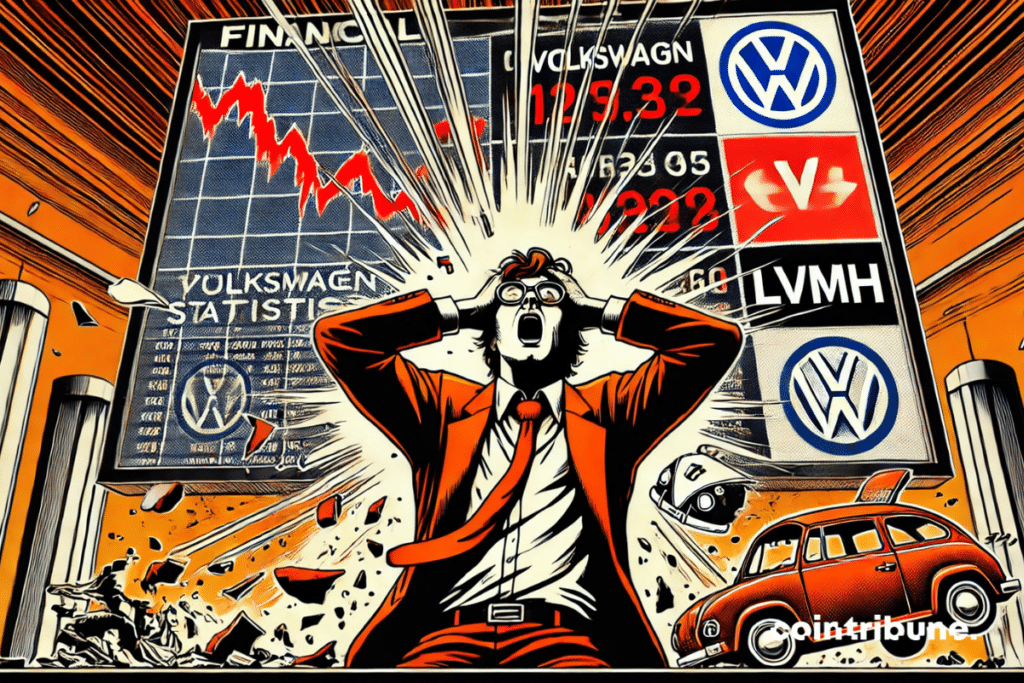Luxury And Auto Sectors Hit Hard By China’s Downturn
In an already fragile global economic context, the Chinese slowdown acts as a shockwave for European companies in iconic sectors such as luxury and automobiles. While these industries had grown accustomed to steady growth fueled by the appetite of the Chinese market, signals from the third quarter paint a bleak picture. Behind the numbers lies a wobbly economic model, leaving deep uncertainties about the future of exchanges between Europe and China.

A Declining Chinese Market, European Giants in Difficulty
The recent announcements from European companies testify to the significant impact of the Chinese economic slowdown on their activities. At Volkswagen, a flagship of the German automobile industry, net profits plunged by 64 % compared to the previous year, with China representing its main market. Mercedes-Benz and BMW, other pillars of the sector, are also recording a drop in sales in this region. These drastic declines are explained by weakened demand, but also by increased competition from Chinese electric vehicle manufacturers. Thus, “local manufacturers have anticipated the situation by diversifying into the European market,” clarifies Éric Kirstetter from the Roland Berger firm.
The luxury sector, long driven by the appetite of Chinese consumers, is also losing momentum. In fact, French groups LVMH and Kering, as well as their Italian counterpart Prada, are experiencing a decline in their sales in the third quarter. Prada’s CEO, Andrea Guerra, summarizes the situation: “the Chinese market is now more complicated and may not improve in the near future.” These statements echo a structural reality. Chinese households, once major consumers of material goods, now prioritize services.
A Structural Transformation with Global Implications
The challenges faced by European companies go beyond an unfavorable economic situation. According to Françoise Huang, an economist at Allianz Trade, China is undergoing a profound transformation, marked by a slowdown in its once rapid growth. “The periods of very high growth that we have witnessed in China over the past decades are part of the past,” explains Famke Krumbmüller from the EY firm. This new paradigm forces companies to rethink their strategies, especially as Beijing struggles to stabilize its economy in the face of increasing geopolitical tensions.
Despite these challenges, opportunities are emerging. In second and third-tier cities, the rise of the middle class could provide a new lease of life to certain industries. These pockets of growth, although limited, represent a chance for companies that are able to adapt. However, major uncertainties remain, particularly with the protectionist policies announced by Donald Trump, which threaten to increase the costs of Sino-European trade.
In this context, the Chinese slowdown, despite new support measures, is a decisive change for Europe. Affected industries will need to adjust their expectations, but also innovate to remain competitive in a rapidly redefining economic world. In the short term, the outlook remains bleak, but a strategic adaptation could turn this crisis into an opportunity for reinvention.
Maximize your Cointribune experience with our "Read to Earn" program! For every article you read, earn points and access exclusive rewards. Sign up now and start earning benefits.
Diplômé de Sciences Po Toulouse et titulaire d'une certification consultant blockchain délivrée par Alyra, j'ai rejoint l'aventure Cointribune en 2019. Convaincu du potentiel de la blockchain pour transformer de nombreux secteurs de l'économie, j'ai pris l'engagement de sensibiliser et d'informer le grand public sur cet écosystème en constante évolution. Mon objectif est de permettre à chacun de mieux comprendre la blockchain et de saisir les opportunités qu'elle offre. Je m'efforce chaque jour de fournir une analyse objective de l'actualité, de décrypter les tendances du marché, de relayer les dernières innovations technologiques et de mettre en perspective les enjeux économiques et sociétaux de cette révolution en marche.
The views, thoughts, and opinions expressed in this article belong solely to the author, and should not be taken as investment advice. Do your own research before taking any investment decisions.